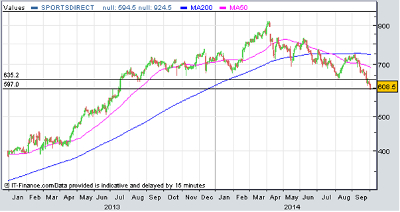Why Sports Direct bought Debenhams stake
3rd October 2014 14:19
by Lee Wild from interactive investor
Share on
has just paid £33 million for a 4.6% stake in . Shares in the department store chain have halved in value since 2012 and profits have fallen for the past four years, so has controversial billionaire founder Mike Ashley spotted a bargain, or has he something else up his sleeve?
Well, it's unclear. Second-guessing the colourful Newcastle United-owner has proved impossible in the past. Of course, Sports Direct wants to get its sportwear in concessions at Debenhams stores - it is already there in Harrow, Southsea, Bristol and Guildford.
Remember, too, that Ashley took out a complicated "put" option on Debenhams in January with maximum exposure of £64 million. Include this, and Ashley's total stake in Debenhams is 11.2%.
"As previously announced, Sports Direct is already working together with Debenhams and looks forward to building this relationship," said Sports Direct, two hours after the stockmarket closed on Thursday. Could Ashley be after a seat on the board? It would certainly speed things up a bit.
Whatever his motives a full takeover of Debenhams appears unlikely - Debenhams' share price is up a modest 3%, suggesting little excitement in the Square Mile. And Ashley's methods are not always embraced by the City, much the same as Newcastle fans love to jeer him at St James's Park.
Ashley is a born gambler. He bought a 4.6% stake in Debenhams at the beginning of the year, but sold it days later for a £5 million profit then took out the put option trade. He likes to use options to take a view on other companies, too, and not just fashion retailers.
He's just placed a huge bet on a recovery at struggling supermarket chain . The fine detail is unclear, but if the option goes the wrong way (ie. if Tesco shares are lower than the option strike price at expiry), it could cost Sports Direct millions - up to £43 million if Tesco goes bust.

(Click to enlarge)
Sports Direct shares have slumped by a third since April near to a 15-month low. Perhaps it is these unconventional methods that have dissuaded investors from backing Ashley.
Analysts at Espirito Santo appear to think so. "Investors have been averse to the group's M&A activity in our view as it does not conform to the predictable pattern best-liked by retail-followers," it writes. "But we would point to the value created for shareholders over time by the aggregate of the group's various strategies. If Sports Direct was not aggressive it would not now be on the point of becoming a major international force."
They estimate fair value for Sports Direct at 850p, almost 50% more than the current share price of 609p, claiming:
The arguments for buying Sports Direct remain the same:
1. It has long-term growth and scale potential way beyond any other UK non-food retail company owing mainly to the international potential of its model in a fragmented European sports good market.
2. Its UK business is capable of achieving more profit through both margin and sales growth.
3. It has online scale potential.
4. Its existing non-UK businesses have major profit margin potential.
Coincidently, Numis Securities arrives at the same price conclusion, reinforced by a "solid" first-quarter update last month - sports retail sales jumped by 16.3% to £611.8 million in the 13 weeks to 27 July, generating growth in gross profit of 15.8% to £260.4 million.
According to Numis estimates, Sports Direct will grow earnings per share (EPS) by an average of 23% over the next two years. That's impressive, and a forward price/earnings (P/E) ratio of 16, dropping to 13 in 2016, does indeed appear modest. The share price is, however, at a major support level at a whisker below 600p. Trade much below that and alarm bells should ring.
This article is for information and discussion purposes only and does not form a recommendation to invest or otherwise. The value of an investment may fall. The investments referred to in this article may not be suitable for all investors, and if in doubt, an investor should seek advice from a qualified investment adviser.